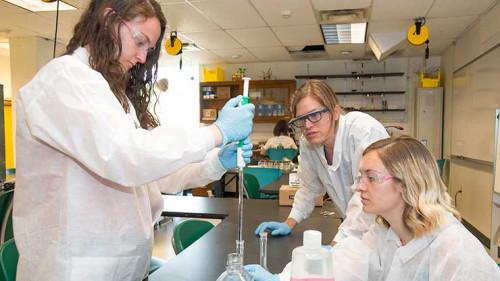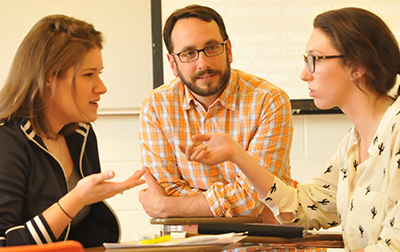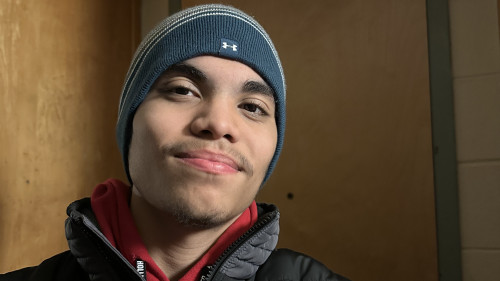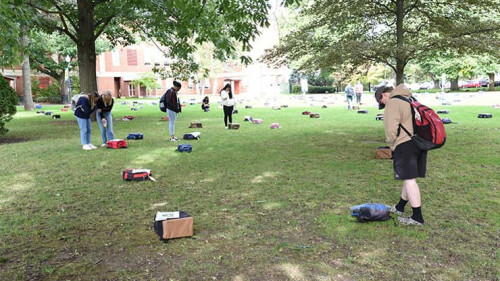

“Agree to disagree.” It’s the clichéd line you might hear when people reach an impasse in an argument or debate. But, when they have the same information, why do people disagree in the first place? The answer to that question is what Assistant Professor of Philosophy Joshua Alexander, Ph.D. is trying to uncover through his research on intellectual humility.
“My project is designed to explore more carefully the relationship between intellectual disagreement and our capacity to be open-minded,” Alexander said. His research focuses on the role that situational factors and specific intellectual and contextual perspectives play in someone’s capacity to be open-minded when another person is not like-minded.
To support his research, Alexander has been awarded a two-year grant valued at more than $110,000 from the Fuller Theological Seminary/Thrive Center for Human Development in concert with the John Templeton Foundation.
“We hold certain beliefs that are explicitly rejected by others, and do so even when exposed to all of the same kinds of evidence and arguments,” said Alexander, an epistemologist who has taught at Siena College since 2008.
Alexander said that the topic of what contributes to disagreement has become increasingly interesting to philosophers who have tended to focus on whether these kinds of situations require people to change the confidence they hold in their beliefs and in what ways. “Less philosophical attention has been paid to what contributes to disagreement, and what this might tell us about its philosophical significance,” said Alexander. “This is a shame, especially because recent work in the social and cognitive sciences suggests that disagreement might actually play a role in epistemic progress.”
Alexander hopes that by having a better understanding of what factors influence a person’s capacity to be open-minded in the face of cognitive diversity, he’ll be able to help people better understand the philosophical significance of intellectual disagreement. “Not only what we should do when we disagree, but what disagreement can do for us,” said Alexander.
Alexander is planning to bring his research into the classroom as well. He is designing a course on intellectual disagreement. “It will blend historical and contemporary philosophical discussions of disagreement with work from the history and philosophy of science and the social and cognitive sciences,” Alexander said, adding that the idea will be to carefully examine the philosophical, sociological and psychological factors that contribute to disagreement, and how cognitive diversity can actually help promote progress by fostering open-mindedness.
Alexander is no stranger to adding new content to Siena’s philosophy curriculum. He has designed and taught classes called Reason and Argument, Philosophy and Psychology and Philosophy of Language and Mind. He has also taught Philosophy and the Human Being, Logic, Philosophy and Knowledge, Philosophy of Science and the Symposium on Living Philosophers.
“When we welcomed Josh Alexander to our department in 2008 we knew we had hired a passionate educator who would excite students and inspire them to explore the nature of consciousness, knowledge and reason,” said Professor of Philosophy and Department Chair Jenny McErlean, Ph.D. “Students find Dr. Alexander to be not only extremely well-prepared and thorough, but ready to inject humor into all phases of learning.”
Under Alexander’s leadership, the departments of Philosophy, Psychology and Computer Science have developed a new Cognitive Science minor, which will launch this fall. “It will bring students to the very edge of research into the ability of humans and machines to perceive, remember and make decisions,” said McErlean. Alexander will direct the new program and teach a new course called Introduction to Cognitive Science.
“I am a strong believer in the liberal arts model of a vibrant academic community that promotes active learning and personal interaction with students,” Alexander said. “I’ve found that Siena College provides an environment in which I can work closely with my students to help them explore the world of ideas, think critically about important issues, express and defend their positions with clarity and reason and connect ideas creatively.”
Most importantly, Alexander said sharing his research and connecting with students in the classroom allows him to help them become better educated and, in the process, become better people. Given those results, even the most astute among us will have a hard time agreeing to disagree with his approach.

